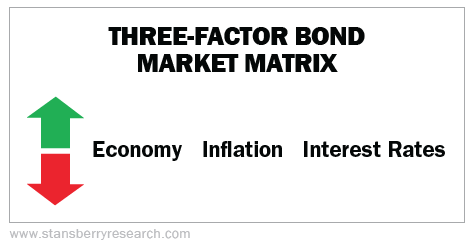Next week, you can safely ignore the Federal Reserve headlines...
The Fed's decision on interest rates at its June 13-14 meeting should have virtually no effect on your life or your investments.
(If those two lines sound familiar, it's because we said almost the exact same thing in March.)
Much like the first interest rate increase in December 2015... the second increase in December 2016... and the third increase in March... folks in the financial media are again warning that the Fed's actions may send the stock market tumbling.
The fact is that interest rates are still at historic lows in the U.S. And no matter what the Fed does, they're likely to remain there.
In Europe, rates have even spent time in negative territory... meaning investors are willing to take a guaranteed loss if they hold to term.
It can be hard to get a handle on what's happening today in the bond market... never mind where things may be headed tomorrow.
Fortunately, as we'll explain today, there's a simple framework to help cut through the noise...
We hope this simple, three-factor "bond market matrix" will give you a more intuitive understanding of what's causing moves in bond markets and interest rates, and help you figure out what will happen next.
Here's the basic bond market matrix:
These three measures (the economy, inflation, and interest rates) usually head in the same direction. If you know which way two are going, you should have a good idea of what's happening to the third.
For instance, if the economy is heating up and inflation is rising, you can be sure that interest rates are rising, too.
Alternatively, when you see interest rates start to rise, you should expect the economy to be doing well or inflation to be rising... and likely both.
You'll notice we don't mention the Federal Reserve or the European Central Bank on there. That's because their direct effects are smaller than most think.
Bond prices and interest rates react to the demand for bonds as safe assets. When the economy is growing safely, investors prefer stocks. They sell bonds and interest rates rise. Similarly, higher inflation makes the income that bonds produce look less attractive. So investors sell bonds when inflation picks up.
It's also important to realize that these actions can happen on the basis of expectations, not necessarily reality.
This month, the Fed is widely expected to raise rates by a modest amount. When the Fed hikes interest rates, many analysts expect bonds to drop... That's the conventional knowledge. And it's what folks calling for a bond crash have argued.
We've always been contrarian on that stance.
[optin_form id="73"]
The Fed's moves simply don't matter much when you consider the trillions of dollars in capital that move in and out of bonds every day. We've argued for years now that interest rates will stay lower (and bond prices higher) than the market expects.
Since the Fed announced its latest rate hike on March 15, bonds across the board have risen.
And look at what has happened in the stock market – every "Fed pullback" has been met with buying: The S&P 500 Index is up about nearly 20% from the first time the Fed raised its interest rate in December 2015... about 7% from its increase in December 2016... and up more than 2% from its March increase.
The lesson here is that markets don't generally pay attention to common wisdom.
As an income investor, you need to keep a diversified portfolio that includes stocks, bonds, and other opportunities.
So before making any kneejerk allocations when the Federal Reserve makes an announcement next week, keep this simple bond market matrix in mind next time you want to get a sense of where the economy, rates, or inflation are headed. You won't find a simpler way to see exactly what's happening.
What We're Reading...
- Did you miss it? Here's why muni bonds will still win out after the Trump tax plan.
- Here's when we said to "ignore the hoopla" ahead of the Fed's March rate hike.
- Something different: The man who mowed his lawn with a tornado behind him says he "was keeping an eye on it."
Here's to our health, wealth, and a great retirement,
Dr. David Eifrig and the Retirement Millionaire Daily Research Team
June 7, 2017

